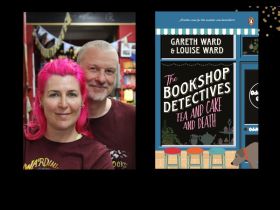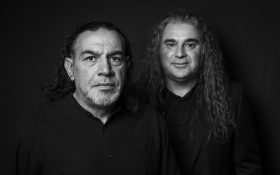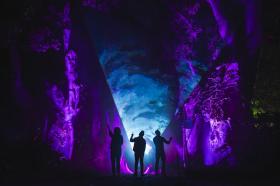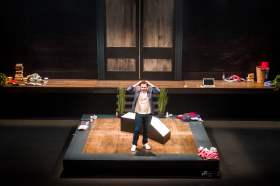Under the unseasonably warm September sun, a young woman asked hip-hop artist Gabriel ‘DyspOra’ Akon how arts organisations can address racism and discrimination without being ‘tokenistic’.
Founder of the independent record label Playback 808, Akon suggested a ‘top-down’ approach that would see under-performing executive staff and board members replaced with dynamic new hires from diverse cultural and linguistic backgrounds. ‘Another “John” can’t solve your diversity problem,’ he said.
A young man in an Oakland Raiders cap fumbled his plastic water bottle, caught off-guard by the cheeky truism.
Can the youth arts sector really provoke cultural, social and political change – all while fighting the effects of the Anthropocene? That was the million-dollar question at this year’s National Youth Arts Summit (NYAS).
Led by young people
Hosted by South Australian youth arts stalwart Carclew – the state’s only multi-art form organisation elevating makers aged 26 and under – the two-day event took place on 12 and 13 September. NYAS invited young and emerging artists, along with those who support them, to converge and converse about their industry and their broader social concerns.
Day one was exclusive to folks under 30, with day two open to practitioners and arts workers of all ages. The entire summit was led by young people – namely, Carclew’s indefatigable Creative Consultants, who helped wrangle the 108 delegates present.
Attendees travelled from across the country to participate in the lively forum – the second NYAS held in SA. As per this year’s theme, ‘Make Space’, independent artists mixed informally with envoys from local, state and federal funding bodies, including Arts South Australia, Country Arts WA, Regional Arts Victoria, and the Australia Council for the Arts, which also sponsored travel costs for a number of regional and remote participants.
In terms of artistic practice, theatre was the discipline most thoroughly represented, though visual artists, dancers, writers and poets, fashion designers, game developers, filmmakers, festival producers, and even self-identified ‘ballbreakers’ were also in the house (more on the anonymous digital participation soon).
Notably, staff from such varied companies as Canberra Youth Theatre (ACT), Bell Shakespeare (NSW), Corrugated Youth Arts (NT), Backbone Youth Arts (QLD), Actnow Theatre (SA), Drill Performance Company (TAS), Courthouse Youth Arts (VIC) and Euphorium Creative (WA) – among many others – ensured that voices from every state and territory contributed to the timely discussions.
An industry in flux
NYAS 2019 was built on foundations laid at the inaugural Adelaide summit in 2017, as well as the Hawkesbury River Youth Arts Summit held in 2016, and Bundanon’s National Youth Theatre Forum Retreat from 2015.
In the years following those formative events, Australia’s arts and cultural landscape – not to mention the physical, geographic one – has experienced substantial shifts in funding, access and inclusion. Industry expectations around the purpose, value and viability of long-term careers for emerging artists are similarly in flux.
So it’s unsurprising that stressors like climate emergency, sustainability, mental health and discrimination were at the forefront of NYAS dialogues, particularly those driven by the younger artists in attendance, many of whom showed remarkable courage and vulnerability as the crowd got down to business.
Kaurna Elder and Carclew Patron Uncle Lewis Yerloburka O’Brien opened the summit with a Welcome to Country that meditated on the roles of weather, climate, and the countless Indigenous conferences that sustained Kaurna yerta for millennia prior to European invasion.
Shortly thereafter, Artistic Associate from Western Australia’s Riptide, Clea Purkins, introduced six provocations to consider throughout the day:
- How can artists use our voice to create cultural shifts in views around green policies?
- What is the arts sector willing to compromise for the sake of the future sustainability of the planet?
- The older generation are not our enemy.
- How can leaders in the youth arts sector prioritise diversity and accessibility in their spaces?
- We demand a National Youth Arts Peak Body.
- Is the promise for young artists 45 years of burn-out and then retirement?
These talking points, with their earnest yet steadfast attitude, were developed by 50 young people at the previous day’s closed forum. Some topics proved more contentious than others, especially when it came to generational disconnect (just over half the group was aged 12–30, with the rest aged 31 and up).
Questioning the gatekeepers
Early in the day, a young woman from Western Australia expressed her concern that established artists and administrators act as industry gatekeepers. In response, Seven News presenter Jane Doyle, who’s 61, divulged that she ‘suffered imposter syndrome for five years’ after becoming Chair of Carclew’s board, and often still feels excluded at arts events. Several other women agreed that, even with years of skin in the game, some anxieties never dissolve. It was realistic, if not reassuring.
And for those who didn’t feel comfortable sharing certain thoughts, feelings and questions aloud, the interactive presentation generator Menti was a reliable outlet. Around the room, overhead screens updated in real-time with demographic data and qualitative feedback.
The anonymised responses were, by turns, amusing, upsetting and insightful; ranging in tone from ‘Keep the rage!’ affirmations, through to pleas like ‘We’re dying out here… Depression, anxiety, suicide are rife,’ to concerns that ‘the young people represented here don’t seem to reflect the diversity of Adelaide or Australia’.
‘How do we heal something we haven’t diagnosed yet?’ asked Akon during the panel session ‘Provocations from the Future’. Referring to the white Australian reluctance to discuss racism, the allegory elicited nods and ‘mmm’s across the room, with the genuine interest carrying over into his deep-dive talk outside on the lawn.
Catalysing change
As the day progressed, further conversations about privilege, policy, education, ecology, wellbeing and beyond fuelled break-out workshops throughout Carclew House. Feedback on Menti described the sessions as ‘valuable’, ‘woke’, ‘chill AF’, ‘brain squishy’, ‘complex’, ‘FULLY DOPE’, ‘deadly’ and ‘fruitful’, among other terms.
However, some delegates worried that all this energy and momentum would soon evaporate, perhaps revealing even more plot-holes and potholes than we’d accounted for. Could attendees really catalyse meaningful change in just one day?
At the very back of the Carclew ballroom, the young man – a boy, actually – in the Raiders cap stood up to read a note off his phone. ‘I am Isaac,’ he said. ‘I am 12 years old from Deniliquin.
‘We need power for people that are different, on boards and as leaders. People need to step aside so we can speak for ourself,’ he said, to fervent applause.
John can’t fix your diversity problem, but it looks like Isaac is ready to get started.





